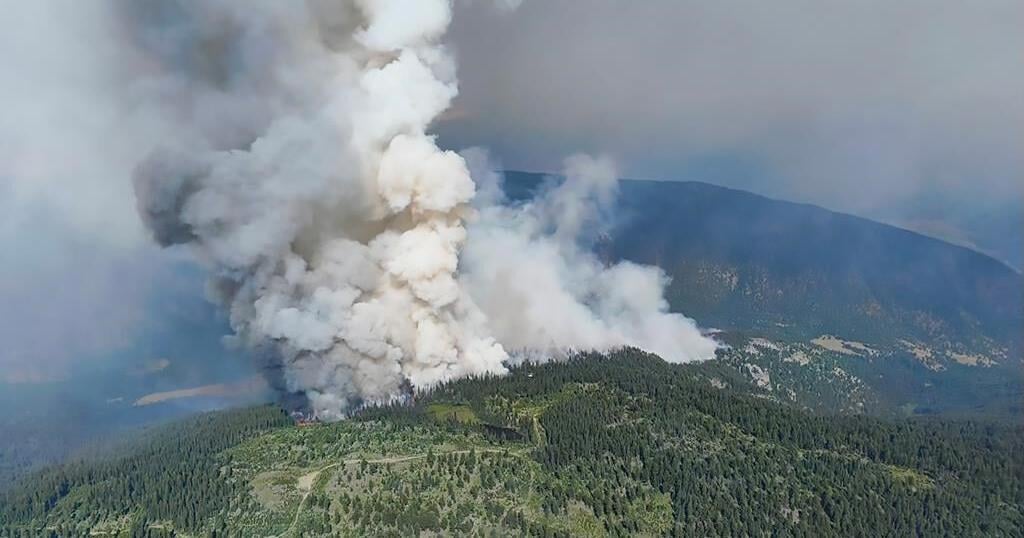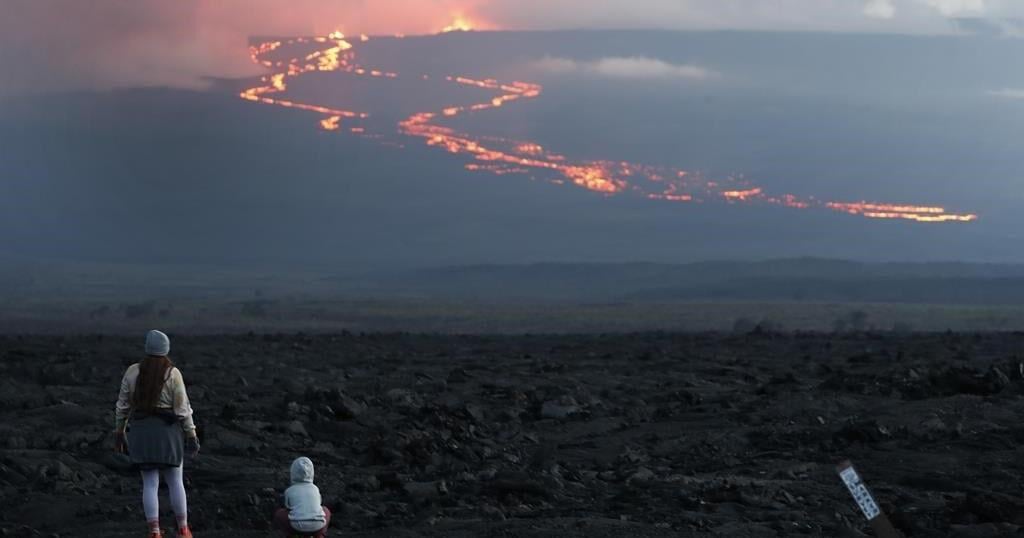KAMLOOPS, B.C. – Nandini Villeneuve and other residents of the Saranagati Hare Krishna village were in a meeting with emergency staff from the Thompson-Nicola Regional District late Wednesday when it was announced that a wildfire bearing down on the religious community had worsened.
“It kind of just took off and then we were told that the meeting is done, and you guys are getting out of here,” said Villeneuve.
She said that when she and the 25 families living in Saranagati left for nearby Cache Creek around 7 p.m., the Shetland Creek wildfire was descending the mountain “like lava coming down,” shocking evacuees with its speed.
The rapid growth of the out-of-control Shetland Creek fire in the B.C. Interior came ahead of a major spike in the number of fires across the province, while the BC Wildfire Service braced for what was expected to be a “very challenging” 72 hours.
By 6 p.m. Thursday, there were about 247 active fires across B.C., according to the BC Wildfire Service online dashboard, including about 100 that started in the previous 24 hours. Just over half the fires were burning out of control.
Early last week, there were fewer than 100 fires burning in the province
The most threatening blaze was the Shetland Creek fire. Emergency Management Minister Bowinn Ma said it required “tactical evacuations,” and grew “quickly and considerably” Wednesday night to span nearly 50 square kilometres.
Ma was in Kamloops, about 100 km east of the fire. She told a news briefing the situation was “very dynamic” and she couldn’t confirm the specific number of evacuees.
Colton Davies, an information officer with the Thompson-Nicola Regional District, said the “orderly” evacuations started at 6 p.m.
“By the time our formal notice was issued at 9 p.m., the evacuation order had already been completed,” he said in an emailed statement.
The evacuation order from the Thompson-Nicola Regional District covers 76 properties in the Venables Valley area north of Spences Bridge. It said residents were to report to the emergency services reception centre at the community hall in Cache Creek.
Cliff Chapman, the director of provincial operations for the BC Wildfire Service, told the briefing that the Shetland Creek fire had displayed “aggressive” behaviour Wednesday night, challenging their suppression efforts.
Villeneuve said the fire was “intense.”
“I have a mountain right in front of me, and it was raging all across, all across the mountain range,” she said.
“When we left last night, we didn’t know if we would have a home this morning,” said Villeneuve.
Chapman said the wildfire service deployed its night-vision-equipped aircraft to a fire for the first time this year, flying over from Penticton to help groundcrews fighting the Shetland Creek fire, which was discovered last Friday and then merged with the smaller Teit Creek fire. Lightning is the suspected cause.
An incident management team was getting set up in the area Thursday, Chapman said.
He told the news briefing that he hadn’t heard of any structure damage due to the Shetland Creek fire, although it was “threatening” structures.
Chapman said he believed the province was “on the precipice of a very challenging 72 hours” with hot, dry weather, dry lightning and strong winds in the forecast.
“For all of British Columbians, my message is (to) be diligent. We are going to see lightning. We saw 1,300 lightning strikes (Wednesday), many of which started fires in the southeast fire centre, and we’ll pick up more (on Thursday),” he said.
The wildfire service was focused on aggressively attacking fires as quickly as possible, but conditions were ripe for new starts and rapid growth, Chapman said.
Cook’s Ferry Indian Band has also expanded an evacuation order related to Shetland Creek fire to include additional reserves along the Thompson River.
The forecast for Cache Creek, north of the Shetland Creek wildfire, shows a daily high of 40 C on Thursday, 38 C on Friday and 40 C over the weekend.
A separate blaze discovered Thursday on the east side of Slocan Lake in southeastern B.C. also prompted the Regional District of Central Kootenay to issue an evacuation order. It covers 11 properties along Highway 6 south of the community of New Denver.
An evacuation alert telling residents to prepare to leave was also issued by the Regional District of Okanagan-Similkameen in the southern Interior, due to the threat posed by the Calcite Creek wildfire.
Environment Canada has issued 28 heat warnings throughout B.C., covering Howe Sound and Whistler, the Fraser Canyon, parts of the Thompson, Okanagan and Kootenay regions, inland sections of the north and central coasts, the northeast corner of the province along with much of the central Interior.
A bulletin from the wildfire service Thursday said the hot, dry conditions mean the landscape is primed for new fire starts.
In Cache Creek, Villeneuve said residents of Saranagati planned to gather to discuss their stressful escape, to “talk about it, and gather our thoughts.”
The International Society for Krishna Consciousness issued a news release about the evacuation, saying Saranagati included a K-12 school and a temple, and the community was “requesting the prayers of devotees around the world.”
“It’s just part of life living in the Interior of B.C., especially when you’re surrounded by forest … you kind of just get used to it,” said Villeneuve.
“But when it’s, like, right on your doorstep, it’s pretty scary. So, definitely a roller-coaster of emotions,” she added. “I didn’t get much sleep last night.”
— By Nono Shen and Brenna Owen in Vancouver
This report by The Canadian Press was first published July 18, 2024.

























